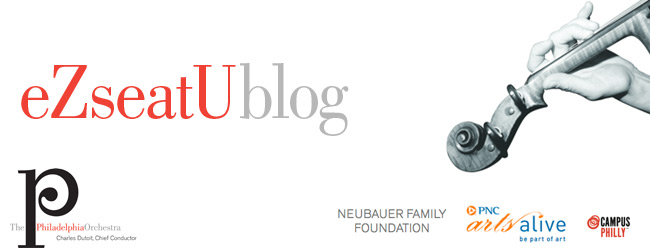1. Welcome back to The Philadelphia Orchestra! I hope all of you had great holidays and are still enjoying your winter breaks. If you have already returned to school, good luck with the beginning of classes!
If you missed attending concerts over the past few weeks, or did not get a chance to attend as many concerts in the Fall as you would have liked, do not worry because upcoming Orchestra concerts contain terrific and exciting programs.
· Mozart’s Requiem: January 6-9, 2011
The Philadelphia Orchestra begins the New Year with one of the most exciting concerts of the season. Music Director Designate Yannick Nézet-Séguin (Yannick) returns to conduct Debussy’s Nocturnes and Mozart’s Requiem, further showing his versatility to Philadelphia audiences.
The Requiem is not only a magnificent piece of music for orchestra, chorus, and soloists, but also a piece full of mystery. The work remained unfinished upon Mozart’s death, leading to suspicions about Mozart’s commissioner. The fictitious play-turned film Amadeus dwells on this issue significantly. The task of completing the work fell on Mozart’s young student, Franz Xavier Sussmayr, as well as other students and composers that his wife Costanze enlisted. This musical setting of the Mass for the Dead was performed in memorial services of many famous figures throughout the 19th-century.

This is a concert not to be missed, as the sold-out status of each performance would indicate: there are few opportunities to hear the Requiem live, especially with a terrific conductor like Yannick. Furthermore, concert-goers will be treated to a Meet and Mingle event with Yannick after the concert in Commonwealth Plaza.
Although these performances are all sold out, if you’d like to go and did not get tickets, you can check with Ticket Philadelphia at 215.893.1999 throughout the week for any last-minute openings. Also, if you have a ticket but can’t make it, make sure you return your ticket for other eager patrons to be able to attend!
· Kim and Kang Play Bach: January 13 and 15, 2011
Next up is an interesting program mixing Baroque, late-Romantic, and 20th-century styles.
The program opens with Arvo Pärt’s Collage über B-A-C-H, a modern piece that pays tribute to J.S. Bach, both by playing on the letters in Bach’s name and using material from Bach’s English Suite No. 6 for the piece.
Following the Pärt, Concertmaster David Kim and First Associate Concertmaster Juliette Kang pair up to perform Bach’s Concerto for Two Violins, a piece with which many student violinists are familiar. Not only will it be a treat to listen to a piece many of us have played, and to listen to the orchestral musicians perform as soloists, but also to listen to a Baroque piece in a symphony concert hall.
The program ends with Bruckner’s Seventh Symphony, a masterpiece often called a eulogy to Wagner.
· Gilbert Conducts: January 20-22
Alan Gilbert, music director of the New York Philharmonic and an avid promoter of contemporary music, will conduct quite a fascinating program.
This program mixes contemporary music with a favorite chestnut.
The program opens with Finnish composer Magnus Lindberg’s flamboyant EXPO. The Philadelphia Orchestra premiere of Christopher Rouse’s Oboe Concerto follows. This premiere will be all the more poignant because the Orchestra’s own principal oboist, Richard Woodhams, will be the soloist.
After these modern works comes Beethoven’s Sixth Symphony, otherwise known as the “Pastoral” Symphony. Unlike his other symphonies, this work is cast in five movements rather than four, to express the programmatic content of the “Awakening of cheerful feelings upon arrival in the country,” “Scene by the brook,” “Merry gathering of peasants,” “Tempest, storm,” and the “Shepherds’ hymn—happy and thankful feelings after the storm.” You might remember this symphony from Disney’s Fantasia, which depicts Greek mythological creatures in these pastoral scenes.
· Schubert’s “Great” Symphony: January 27-28, 2011
January ends with another interesting concert.
The program begins with Mozart’s Adagio and Fugue in C minor—another example of Mozart’s mature compositional style.
The pianist Andreas Haefliger’s account of Bartók’s lyrical and tranquil Piano Concerto No. 3 follows. The program ends with Schubert’s Symphony in C major, aptly nicknamed the “Great” Symphony for its extent and intensity.
--Amalya Lehmann





